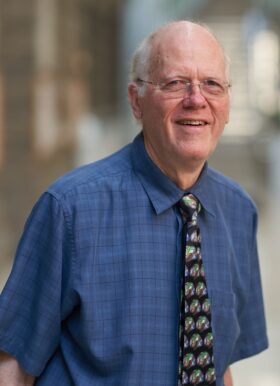
David Van Essen, PhD
Alumni Endowed Professor of Neuroscience
- Phone: 314-362-7044
- Email: vanessen@nospam.wustl.edu
Van Essen Lab | Google Scholar Profile | Neurotree
Research
The Van Essen laboratory studies the structure, function, connectivity, development, and evolution of cerebral cortex in humans and nonhuman primates. Neuroimaging and neuroanatomical data are used extensively for these studies, acquired mainly through collaborative efforts with colleagues at Washington University and other institutions. A major emphasis within the lab is on the development and utilization of methods for computerized brain mapping as well as neuroinformatics tools that facilitate data analysis and data mining. Dr. Van Essen has served as a Principal Investigator for the Human Connectome Project (HCP), a large-scale effort to acquire, analyze, and freely share high-quality neuroimaging data from 1200 healthy adults, in order to enable exploration of brain connectivity and its relationship to behavior. The lab is particularly interested in using HCP and other high-quality datasets to better understand cortical parcellation and connectivity in humans and nonhuman primates.
Selected publications
- Van Essen, D.C. (2020) A 2020 View of Tension-Based Cortical Morphogenesis. Proc Natl Acad Sci. 2020 Dec 15:202016830. doi: 10.1073/pnas.2016830117. Online ahead of print. PMID: 33323481
- Van Essen, D.C., Donahue, C.J., Coalson, T., Kennedy, H., Hayashi, T., Glaser, M.F. (2019) Cerebral cortical folding, parcellation, and connectivity in human, nonhuman primates, and mice. Proc Natl Acad Sci 116:26173-80. doi: 10.1073/pnas. 1902299116
- Van Essen, D.C. and Glasser, M.F. (2018) Parcellating cerebral cortex: How invasive animal studies inform non-invasive map-making in humans. Neuron 99:640-663.
- Coalson, T., D.C. Van Essen, and M.F. Glasser. (2018) Lost in space: The impact of traditional neuroimaging methods on the spatial localization of cortical areas. Proc Natl Acad Sci 115: E6356-E6365
- Glasser, M.F., Smith, S.M., Marcus, D.S., Andersson, J. Auerbach, E.J., Behrens, T.E.J., Coalson, T.S., Harms, M.P., Jenkinson, M. Moeller, S., Robinson, E.C., Sotiropoulos, S.N., Xu, J, Yacoub, E., Ugurbil, K., and Van Essen, D.C. (2016) The Human Connectome Project’s neuroimaging approach. Nature Neuroscience 19: 1175-1187 (doi:10.1038/nn.4361). PMID: 27571196
- Glasser, M.F., T.S. Coalson, E.C. Robinson, C.D. Hacker, J. Harwell, E. Yacoub, K. Ugurbil, J. Andersson, C.F. Beckmann, M. Jenkinson, S.M. Smith, and D.C. Van Essen. (2016) A multi-modal parcellation of human cerebral cortex. Nature 536: 171-178. (doi: 10.1038/nature18933). PMID: 27437579
- Markov, N.T., Ercsey-Ravasz, M.M., Ribeiro Gomes, A.R., Lamy, C., Magrou, L., Vezoli, J., Misery, P., Falchier, A., Quilodran, R., Gariel, M.A., Sallet, J., Gamanut, R., Huissoud, C., Clavagnier, S., Giroud, P., Sappey-Marinier, D., Barone, P., Dehay, C., Toroczkai, Z., Knoblauch, K., Van Essen, D.C., and Kennedy, H. A weighted and directed interareal connectivity matrix for macaque cerebral cortex. Cereb Cortex. (2014) 24:17-36. Epub 2012/09/27. PMID: 23010748
- Felleman DJ and Van Essen DC. (1991) Distributed hierarchical processing in the primate cerebral cortex. Cereb Cortex. (1991) 1:1-47. doi: 10.1093/cercor/1.1.1.PMID: 1822724
See a complete list of Dr. Van Essen’s publications on PubMed.
Education
1967 BS (Honors) Chemistry, California Institute of Technology, Pasadena, CA
1971 PhD, Neurobiology, Harvard Medical School, Cambridge, MA
1973 Postdoc, Neurobiology, Harvard Medical School, Cambridge, MA
1975 Postdoc, Neurobiology, University of Oslo, Norway
Selected honors
1994 Fellow, American Association for the Advancement of Science
2002 Krieg Cortical Discoverer Award (Cajal Club)
2007 Peter Raven Lifetime Achievement Award, St. Louis Academy of Science
2015 Second Century Award (Washington University School of Medicine)
2017 Member, National Academy of Sciences
2017 Glass Brain Award, Organization for Human Brain Mapping
2017 Carl and Gerti Cori Faculty Achievement Award, Washington University School of Medicine
2017 George A. Miller Prize, Cognitive Neuroscience Society